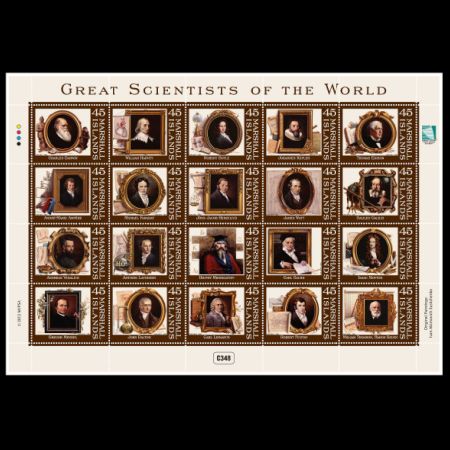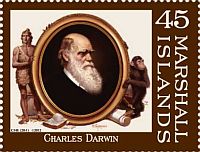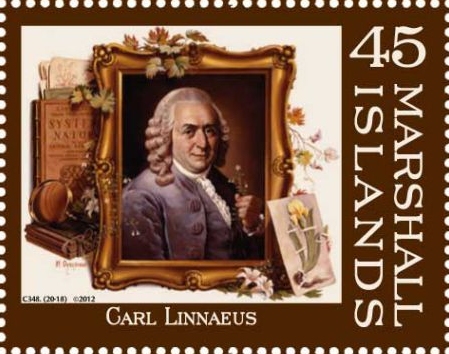Marshall Islands 2012 "Great Scientists of the World"
| <prev | back to index | next> |
| Issue Date | 23.04.2012 |
| ID | Michel: 2924-2943; Scott: 1032a-t; Stanley Gibbons: 2795-2814, MH 2795a; Yvert et Tellier: 2842-2861; Category: Co |
| Design | Artwork: Ivan Akimovich Sushchenko |
| Stamps in set | 20 |
| Values |
US$ .45 - Charles Darwin US$ .45 - William Harvey US$ .45 - Robert Boyle US$ .45 - Johannes Kepler US$ .45 - Thomas Edison US$ .45 - Andre-Marie Ampere US$ .45 - Michael Faraday US$ .45 - Jons Jacob Berzelius US$ .45 - James Watt US$ .45 - Galileo Galilei US$ .45 - Andreas Vesalius US$ .45 - Antoine Lavoisier US$ .45 - Dmitry Mendeleyev US$ .45 - Carl Gauss US$ .45 - Isaac Newton US$ .45 - Gregor Mendel US$ .45 - John Dalton US$ .45 - Carl Linnaeus US$ .45 - Robert Fulton US$ .45 - William Thomson, Baron Kelvin |
| Size (width x height) |
stamps: 40mm x 31mm Sheet: 224 mm x 154mm |
| Layout | Sheet of 20 stamps |
| Products | FDC x4 |
| Paper | unwatermarked gummed paper |
| Perforation | 13.50 x 13.50 |
| Print Technique | Black, cyan, magenta, yellow by offset lithography |
| Printed by | Pioneer Printing, Cheyenne, Wyoming, U.S.A. |
| Quantity | |
| Issuing Authority | Marshall Islands Postal Service Authority |

On April 23, 2012, the Marshall Islands Postal Service issued the set of 20 stamps featuring great scientists of history. History has seen many great scientists who have made priceless contributions to the advancement of mankind, and in 2012 the Republic of the Marshall Islands issued these stamps to honour 20 of the greatest scientists with Charles Darwin and Carl Linnaeus among them.
Darwin, for instance, is famous for his theory of evolution through natural selection, while Edison is best known for inventing the incandescent light bulb. Newton is remembered for postulating his theory of gravity, and Linnaeus is renowned for developing a system to classify living things.
Among these great personalities, Charles Darwin and Carl Linnaeus can be considered as contributors to Paleontological Science.
Charles Darwin was born in Shrewsbury, Shropshire in 12 February 1809, to a wealthy and well-connected family. He had initially planned to study medicine at Edinburgh University but later switched to Divinity at Cambridge encouraged a passion for natural science.
 |
| Charles Darwin on stamp of Marshall Islands 2012, MiNr.: 2924, Scott: 1032a. |
Darwin 1859 book "On the Origin of Species" established evolutionary descent with modification as the dominant scientific explanation of diversification in nature. He examined human evolution and sexual selection in "The Descent of Man, and Selection in Relation to Sex", followed by "The Expression of the Emotions in Man and Animals". Charles Darwin research on plants was published in a series of books, and in his final book, he examined earthworms and their effect on soil.
 |
| Carl Linnaeus on stamp of Marshall Islands 2012, MiNr.: 2941, Scott: 1032r. |
In recognition of Darwin's pre-eminence, he was one of only five 19th-century UK non-royal personages to be honoured by a state funeral, and was buried in Westminster Abbey, close to John Herschel and Isaac Newton.
Darwin's work had far-reaching impacts on the development of Paleontology, Anthropology and many other Biology and Physiology related sciences.
Carl Linnaeus, also known after his ennoblement as about this sound Carl von Linne, was a Swedish botanist, physician, and zoologist, who laid the foundations for the modern scheme of binomial nomenclature uses in all biology related sciences (including Paleontology). He is known as the father of modern taxonomy, and is also considered one of the fathers of modern ecology.
Products and associated philatelic items
| FDC | ||
 |
|
|
References
 |
- Technical details and short press releases:
Marshall Islands Stamp Catalog (this website does not exist anymore), colnect. - Charles Darwin:
Wikipedia, Encyclopaedia Britannica, Strange Science. - Carl Linnaeus (Carolus Linnaeus):
Wikipedia, Encyclopaedia Britannica, Strange Science.
Acknowledgements
Many thanks to Dr. Peter Voice, PhD Department of Geological and Environmental Sciences, Western Michigan University, USA, for reviewing of a draft of this article.| <prev | back to index | next> |